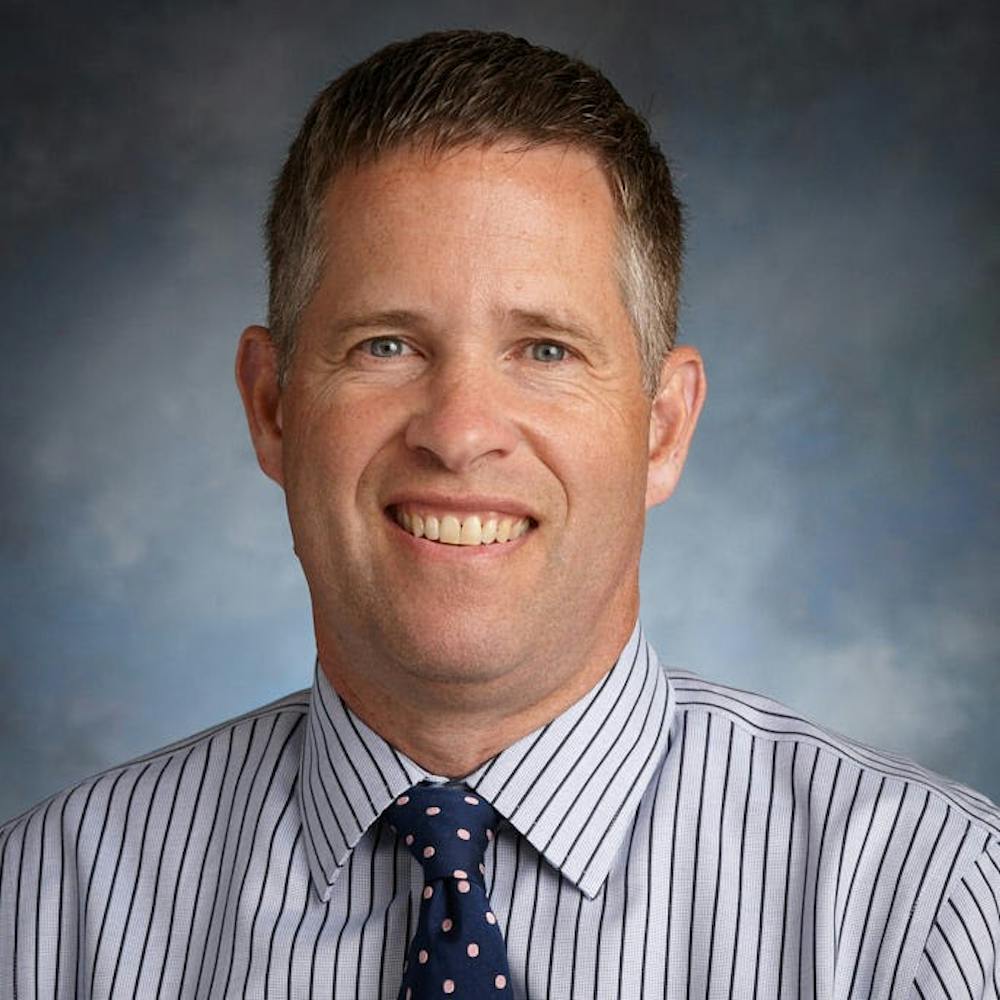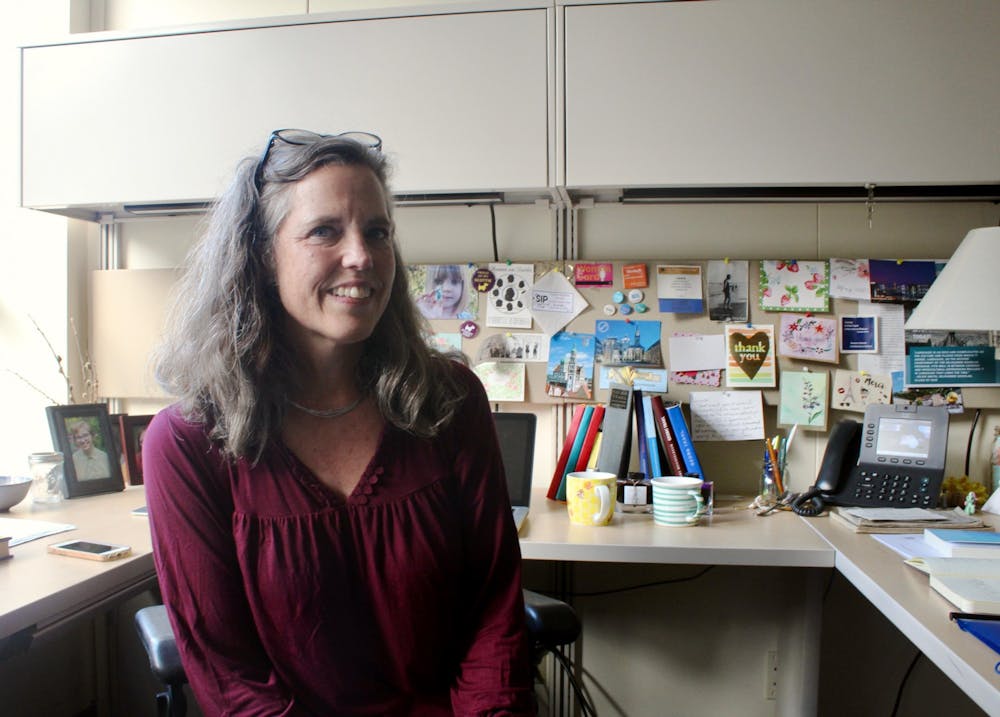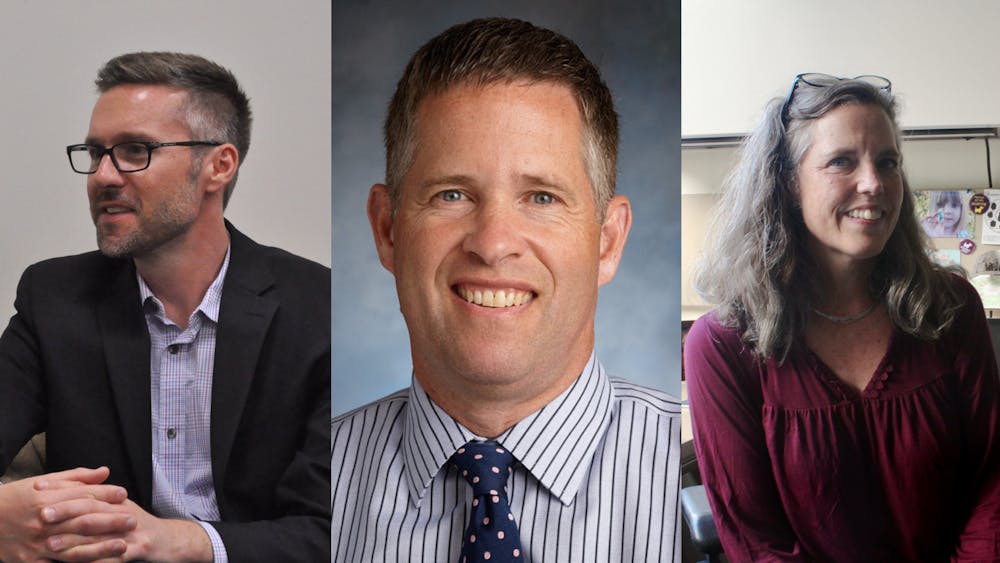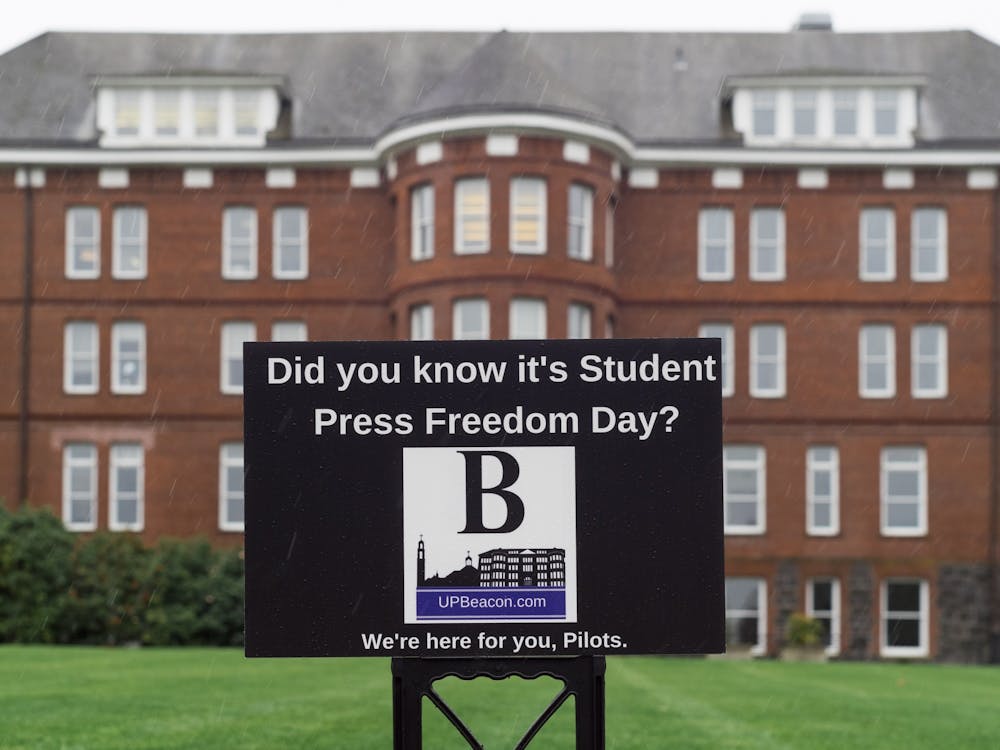During the pandemic, the University of Portland has seen many employees and administrators leave, including University President Fr. Mark Poorman. In April it was announced that three administrators would resign effective June 1. This group includes the Dean of Admissions Jason McDonald, Interim Dean for the College of Arts and Sciences (CAS) Laura McLary and Associate Vice President for Student Development Matthew Rygg. The Beacon sat down with them individually to discuss their careers, the University and where they’ll go from here.
Matthew Rygg, associate vice president for student development

Matthew Rygg will be working with the Clarity Consulting Group.
Whether it be Title IX, the CARE team or the Career Center, Rygg has done a lot of work alongside his role as associate vice president for student affairs. It has been a tumultuous five years for Rygg, and for the University. Rygg will be moving on to work with the Clarity Consulting Group doing management consulting and executive coaching. The University has yet to announce an interim or permanent replacement for Rygg.
“This role, and senior student affairs leadership positions in general are hard, but they’re very difficult at a place like University of Portland,” Rygg said. “If you think about what we’ve experienced in the last five years, some very difficult Title IX cases, we’ve experienced a racial reckoning period socially, we have endured a pandemic together, a number of administrative controversies, changes in leadership, and wildfires, you name it, and I think the role of student affairs in that is to be responsive to student needs and mobilize resources and support.”
Rygg’s work at UP has been student-centered, and he pointed to his time working with the CARE team, and sitting on the Behavioral Intervention and Threat Assessment (BITA) team, as some of the most rewarding.
“Supporting our behavioral intervention and threat assessment team and bringing that framework to our CARE team has been really satisfying for me, it's work that I’ve done at other institutions,” Rygg said. “We did our work really well and did it quietly. I can tell you first hand that it saved lives.”
The Care Team began as Early Alert in 2016, and it is as a safety net for students going through a mental health crisis. Faculty, staff or other students can send referrals to the Care Team if they’re worried about another student. From there, the cases are sent to the BITA team which includes the campus psychologist and several UP directors and administrators.
“I’d say probably the last two years of my career here I felt more like a hospital administrator than I did a university administrator, in part because of all the COVID planning that we were doing,” Rygg said. “But the year before that it was mental health triage, pretty much most of my time.”
Rygg also served with former Vice President for Human Resources Sandy Chung to restructure Title IX as the Title IX coordinator for education.
“We did an incredible amount of work in a short period of time,” Rygg said. “We overhauled pretty much every part, every process, communication, training, you name it for Title IX, and brought on new staff to support that work. That was rewarding work.”
COVID-19 posed a challenge to UP and institutions all over the country, but Rygg is proud of the University for rebuilding its operations and moving forward despite the roadblocks. He highlighted the resilience and adaptability of his staff during that 13-14 month process.
Rygg has been in a unique position as the first openly gay man on the President’s Leadership Cabinet. He feels it has given him the sensitivity to advocate for minority groups at the University, and is grateful for that opportunity, regardless of the discomfort that came with it.
“I was willing to experience some discomfort along the way knowing that it’s important to open minds and change hearts by just being myself and allowing people to see that I put on my pants the same way they do,” Rygg said.
Rygg has faced more unconventional challenges during his career, including the alleged assault by former University employee Patrick Ell in 2019. Ell pleaded not guilty, and was indicted with one count of Second Degree Assault, a felony. The next court hearing is on June 3.
Despite the difficulties Rygg faced, he still values his time at UP.
“I’m also going to miss the staff and faculty,” Rygg said. “This is a special place, and it's experiencing growing pains right now, but this is a really wonderful place. In a lot of ways this was a really hard decision to make.”
Jason McDonald, dean of Admissions

After over 22 years at UP, McDonald is taking time to be more present at home and be with his family.
Photo courtesy of UP Marketing and Communications.
McDonald has been with UP since 1997, where he started as a hall director in Kenna Hall. In the summer of 1998, he moved to the Department of Admissions, and was promoted to the dean of admissions in 2006. Carrie Donnellan will take over as interim dean of Admissions, according to McDonald.
McDonald is going to take this time to be more present at home. He has no set career plans moving forward, and is going to take this time to reflect and be with family.
“It’s been a great journey, but it’s also demanding,” McDonald said. “I’ll have a senior and a freshman at Central Catholic, so this will be a chance to take a break but also be with them, and be at home for a little bit. It all kind of aligned to be the perfect time to do this.”
He has spent 15 years as the dean of admissions, and has experienced a great deal of pressure in this role. During McDonald’s time, UP’s first-year class has increased from under 800 from when he started, to consistently 1,000 before the pandemic hit.
“Fifteen years is a long time in my role,” McDonald said. “And really the reason that is just the pressure and stress of being responsible for basically the revenue of the institution. You kind of carry the burden with you 24/7.”
McDonald is proud of the efforts Admissions has made to have a more diverse and higher achieving student body at UP. He is also appreciative of the people he’s gotten to work with over the years.
“All the colleagues that I’ve worked with in my office have just been amazing people,” McDonald said. “A couple things I’m proud of certainly is the change with geographical diversity at UP and ethnic diversity. I think we’ve elevated UP in a lot of different ways through the quality of students that we’ve brought in these last 15 years.”
The Admissions team had a difficult road ahead when classes went virtual last March, with so many programs, like Weekend on the Bluff and visitation days, being cancelled last minute.
“On the admissions side, it was quite a challenge last March,” McDonald said. “We pretty much had to do a 180 shift in how we recruited the last six weeks of the cycle. It was stressful, but also a great opportunity for our team to come together and create opportunities virtually to try and bring in the class the best we could.”
This year’s recruitment cycle proved just as difficult, as travel and other COVID-19 restrictions were put in place. Admissions slowly opened opportunities for families to visit in-person, while also taking advantage of virtual programming. Most recently, Admissions teamed up with other University groups to host Welcome to the Bluff.
“I just have to give so much credit to the staff for being willing to do that,” McDonald said. “That was hopefully a great program for the families that visited.”
These efforts, as well as easing restrictions and rapid vaccine deployment, are helping UP’s prospective enrollment. The incoming first-year class of Fall 2021 is only 20 confirmations behind the Fall of 2019, according to Donnellan. Admissions is still receiving deposits for incoming transfers. McDonald credits the admissions staff for the successful pivot during the pandemic.
After a lot of reflection, career pressures and the pandemic have taken their toll, and McDonald decided it was time for a change of pace.
“15 years, it just kind of hit a point, COVID might have sped that up a little bit, but it was a lot of reflection and it just seemed like the right time for me to make a change and take a break. Really just a mental break and not have that stress.”
Laura McLary, interim dean for the College of Arts and Sciences

Laura McLary will be serving as the provost at Hollins University in Virginia.
McLary had started her career on The Bluff as an assistant professor of German. Even after being offered a job with a more established German program, she chose to come to UP because it was an opportunity to build something from the ground up. Philosophy Professor Norah Martin has been appointed as the next interim dean of the CAS.
“When I first came to UP our German program was nonexistent, and we didn’t have a major,” McLary said. “I wanted to come here because it was small… and it felt like there was a lot of possibility.”
From her start over 20 years ago, McLary has climbed the ladder at UP, and after a little under one year as Interim Dean of the CAS, she will be moving on to serve as the provost at Hollins University in Virginia.
“I’m actually weirdly happy to be sad to leave,” McLary said. “I have so appreciated working with my colleagues who care really deeply about teaching, about research, about students, and one thing for me that has just been wonderful about being at UP is the student-centered focus of the institution.”
Hollins is an all-female school with just under 800 students. McLary is looking forward to working in a space promoting women’s leadership, as well as working with recently appointed President Mary Hinton. McLary’s role as provost has been newly defined as the Hollins office of academic affairs is restructured.
“That really spoke to me because a lot of the work that I’ve done at kind of creating structures and programs and things like that, it’s kind of a similar opportunity to rethink something and grow it and build it,” McLary said.
In her 22 years, she has seen the German program evolve and add a full major. McLary has done a lot of work in internationalization at UP, and has worked closely with the Collaborative for International Studies and Global Outreach. McLary also helped to found the Public Research Fellows program, which provides structure and support to faculty-student research projects.
“At the same time I feel like I’ve had tons of opportunities to grow things and to make them run in ways that they didn’t before,” McLary said.
She takes pride in being able to support students in their post-academic lives. McLary has also had dozens of students go on to be successful Fulbright recipients.
It’s a long journey ahead, and McLary is in the thick of the moving process. Her husband, and administrator for the learning commons, Jeffrey White, will be leaving UP with her.
“We’re very much in the thick of all the transition stuff, and selling our house, and thinking of putting the cats in an airplane,” she said.
McLary still feels invested in UP, and plans to keep tabs on the community moving forward.
“I’m really excited about where I’m going, but I’m just going to miss everybody too,” McLary said. “You know, I have friends here! I think I’d want to tell my alums too, like, I’m still here. You can still contact me, and I want to know how you’re doing and where you are. I’m not going away, I’m just going somewhere else.”
The pressure of vacancies and moving forward
With so many University administrators and employees leaving, there is a lot of pressure on the people expected to fill in those gaps. Moving forward, Rygg hopes that UP will recognize the value of their staff members and take this opportunity to change.
“I worry about our staff here,” Rygg said. “I think our staff are underappreciated and underpaid. It’s [the] staff and administration that have to carry out these plans and help the University pivot in these difficult times, and we’re doing that without paying people appropriate salaries.”
This kind of turnover may be difficult for administrative teams as they adjust to new leadership and colleagues.
“I think the challenge would just be continuity,” McDonald said. “You're used to working with certain colleagues and then changing who you have to work with depending on the office can be a challenge.”
Looking at the University as a whole, there has been a lot of unrest amongst students, faculty and staff concerning areas of diversity and inclusion. Although efforts have been made to address these concerns, such as the hiring of the Director of the Ethnic Studies Program Amy Abugo Ongiri, there is a lot more work to be done.
“You know the Catholic Church is a very hierarchical institution, and universities are also hierarchical,” Rygg said. “So when you have a Catholic university, it’s by default very hierarchical. Hierarchy doesn’t work so well when we’re trying to dismantle power and privilege and make more equitable systems.”
UP has still not announced a replacement for current University President Fr. Mark Poorman since Fr. Jim Lies announced he would not be accepting the interim presidential appointment. Poorman will be stepping down on July 1.
As much as these vacancies invite challenges, McLary also sees it as an opportunity for UP to have new faces in leadership.
“It is a drain on the institution to some degree, but it also creates openings for other people who want to take on leadership roles to step in,” McLary said. “Maybe it’s also an opportunity to ask the question, ‘Do we want to see things differently?’”
Austin De Dios is the Editor-in-Chief of The Beacon. He can be reached at dedios22@up.edu.








